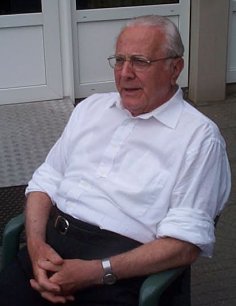During most of his life Paul was troubled by different
sicknesses like Bilharzia and malaria, a stroke and the illness of Kahler.
Besides this his sensitivity was influenced by injustices, opposition to his
views and just worries. In spite of these he lived an active missionary life.
He was born in Beek en Donk on December 7th 1920 as
child of Herman van Thiel and Anna Meuwese. His brother joined the Premonstratensians
of Berne abbey. His sister married Dr. Geerdes and she thus had three White
Fathers as in-laws. He started his priestly training at "Beekvliet"
seminary of the diocese of Bois-le-Duc, continued his formation with the Norbertines
in Heeswijk and finished these at the Society of the Missionaries of Africa
(White Fathers). He studied at the "St Charles" house of philosophy
at Boxtel and his further studies took him to 's-Heerenberg where Paul took
his missionary oath on May 22nd 1947 and was ordained priest on April 11th,
1948. He departed for the diocese of Ruwenzori-Mbarara in Uganda early 1949.
Until the year 1962 Paul worked in different parishes but longest in Nyamitanga
and Mbarara. He got to know the Runyankole language well.
Paul was a musician. At early age he played the piano
and the organ and studied the theory of Gregorian chant as well as the history
of music and composition. Once in Africa he showed great interest in traditional
Ankole music. He wrote: "As a missionary I want to put my work at the
service of the African Church. I want to meet composers who also are involved
with church music, I want to learn from them and encourage them, possibly
advise them how to make use of their talents to promote African liturgical
music". In the five western kingdoms in Uganda the rich musical heritage
was bound to disappear and Paul decided to bring this to a halt. He wrote
about this: "The missionary message of each Christian is to proclaim
the good news of the Son of God to the world. Each tribe and nation will do
that in in its own tradition. Church music here is often too European and
this ought to be changed". Therefore his main attention and life-long
interest was in studying, promoting and recording this music and to make it
serve in church liturgy. He made contacts with Banyankole musicians and dancers,
with choir masters and missionaries who also tried to Africanise church music.
Paul did research in these fields, made tape recordings, took photographs
and made films and also composed hymns in the African style. He had access
to the royal courts of Ankole and Bunyoro and was allowed to study and document
on the rituals.
Paul's work was appreciated. It was admired how he
endeavoured to conserve the African music and rituals. Fellow missionaries
of Zambia, Tanzania, Malawi and Uganda collected texts, music and cultural
objects in order to preserve these for future generations. They collected
language notes, proverbs and wrote down many African stories. Musea in Bujola,
Mbala, Mua and elsewhere as well as our own libraries and archives in Rome
are witnessing to his missionary dedication. Paul was also appreciated outside
Ankola territory and he applied for and took courses at the School of Oriental
and African Studies in London during the year 1963, in 1965 at Makerere University,
Uganda, and at the UCLA of Los Angeles from 1967 till 1968.
All this dedication and his studies resulted in many
publications in magazines, more research, sessions and radio broadcasts. He
wrote a study called "Multi-tribal Music of Ankole ", composed a
lexicon about the Runyankole music terminology and assisted the monks of a
Trappist monastery in Kenya and Franciscan sisters in Uganda to improve their
singing of the Office and he also composed a hymnal.
More research followed in western Uganda, and his classes and teaching continued
in East- and in West-Africa, in pastoral centres of protestant and catholic
churches.
He also met with opposition as some European collegues
thought him intrusive. Some African monks wanted to make more use of their
own instruments while Paul rather suggested more vocal music. Paul could be
quite critical himself but would not tolerate it from others. Referring to
such he wrote that "they seem to crush and batter their instruments".
All his research, his work and contacts sometimes created tensions, and there
were also constant anxieties about funding his research work. As a musician
and man of arts these tensions caused his health to deteriorate. Yet his interests
in this field remained with him. It affected his frail health.
He returned definitively to the Netherlands in 1974
and became chaplain to "de Beemden", a home for the elderly at St.
Michielsgestel, where he offered all the necessary pastoral care. But here,
too, he actively promoted the participation of the people in the liturgy.
But he also visited again Eldoret (Kenya) Vienna, Tervuren near Brussels,
and Zambia where he gave courses.
In 1992 Paul took up residence in our retirement home
at "St Charles", Heythuysen. He was a contented man and grateful
for the good care he received in our house. Whenever he was asked to play
the organ in one of the villages in the neighbourhood he consented. During
the last few years his health appeared to be strong, partly because of the
good care he received at "St Charles". He was grateful for this.
But then his final days came abrubt. After a rather short illness Paul died
peacefully at our house "St Charles" on January 3rd 2006.
In the book of Psalms we find: "Sing a new song
to the Lord, all you people; sing to the Lord and bless his name". May
Paul's voice be added to the heavenly choirs. May he find the peace that the
world cannot give.
